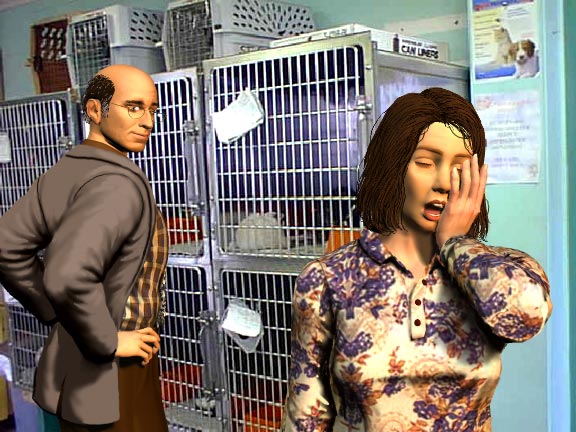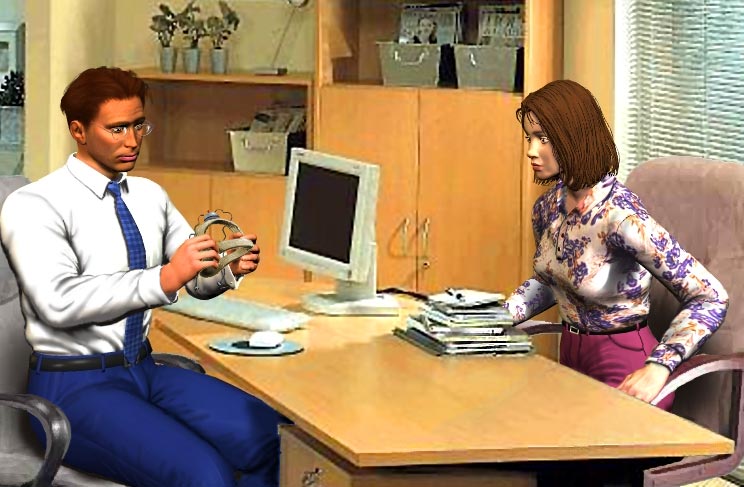|
Rapid Eye Movement by Joe Zabel |
'Mondays are always the worst, aren't they?' asked Ross Kerbach, reporter for the Daily Wausau Times. 'Not usually for me-- I just had a few really bad nights...' said Kathy. 'Anyway, I wanted to show you Dr. Brill's work with dogs-- I think your younger readers will really love this.' |
 |
As they approached the lab, the researcher in question was working with a young golden retriever, teaching it to roll over. Other dogs were confined to spacious cages at the opposite corner of the lab.
'I don't want to disturb him in the middle of one of his training sessions,' said Kathy. 'Let me explain--' Kathy pointed to a chart of brain wave patterns. 'Scientists have known for years that the REM stage of sleep will increase slightly when the subject has been exposed to a learning experience before sleep. This suggests that REM functions somehow to store learning experiences. Dr. Brill subjects these dogs to various types of learning experiences; for example, right now he's teaching this animal to respond to spoken commands; another dog might be placed into a problem-solving situation without a person present. In either case, when the dog sleeps afterward, Dr. Brill studies the animal's brain activity.' 'Do the dogs have little holes drilled in their heads?' asked Kerbach. 'I'm afraid they do,' said Kathy, 'but not as many as used to be necessary for this kind of study. The dogs are anaesthetized during the procedure, and suffer no permanent damage.' 'And what happens to the dogs at the end of the study?' Kathy gestured towards the caged dogs. 'These are healthy animals that have been well-treated and trained by an expert. Brill has a lot of luck placing them in good homes when he's done with them.' 'But most of them get sent to the pound, isn't that right?' Kathy frowned. 'I'm afraid he doesn't have any choice.' 'Well, the DOGS certainly don't!' 'Dr. Brill is engaged in pure research,' said Kathy. 'But you can easily imagine the importance of the principles he's trying to isolate. For example, we might find out that some learning-disabled children have deformations in the REM-stage sleep periods-- in which case Dr. Brill's research could be incredibly helpful to them.' 'What about human subjects-- do you conduct experiments on them as well?' asked Kerbach. 'We have volunteers who participate in studies,' said Kathy. 'As a matter of fact, I'm one of them!' Kerbach looked at one side and then the other of Kathy's head. 'I don't see where they drilled the holes,' he commented wryly. 'I guess they haven't found them necessary in my case,' replied Kathy. 'In his previous practice, Dr. Vaughn was known for some rather intrusive techniques, wasn't he?' pursued Kerbach. 'I'm not well-versed in the Doctor's previous work. Maybe you can ask him for details when you meet with him later today.' 'Good idea. I also mean to drill him (pardon the pun) about his planned announcement at VISR's Christmas party. Surely it's in his interest to give me an advanced briefing.' 'If it takes your mind off of human experimentation,' thought Kathy, 'then all the better!' 'Here boy,' called Dr. Brill to the dog. At 10:30 AM, Kathy walked into Dr. Yang's office. Margo greeted her with concern. 'Honey, you look like you've been hit by a mack truck!' 'I had a lot of trouble sleeping over the weekend,' said Kathy. 'I must've had an allergic reaction to Dr. Yang's nightcap device!' 'Well, Alan wants to talk to you about that-- let me ring him.' Minutes later, kathy was sitting with Dr. Yang in his therapy room. He was giving her a brief physical, examining her irises with a magnifying glass. 'These troubles began the first night you wore the cap?' 'That's right,' said Kathy. 'Let me have a look at it. I'd like you to take a couple of vitamins; and you need a good two-hour nap. You should be sent home sick-- but in your shape, you shouldn't be driving. Fortunately, that's one thing we have plenty of in the Institute-- comfortable sleeping rooms!' |
 |
An hour and a half later, Kathy returned from one of the clinic bedrooms. She was yawning. Yang was examining the nightcap, and glanced over his shoulder. 'Feeling better?'
'Absolutely! Mmmnn, I'm stiff as a board.' She yawned, 'I'm going to have to do some stair-climbing before I get back to work.' 'That's the way,' said Yang. 'I'm afraid we can't tell anything about your experiences from the nightcap-- it's fried. The recording mechanism has nothing but garbage on it. Strange, I've never seen that before.' 'Do you think it's possible,' asked Kathy, 'that the nightcap somehow caused what I experienced? Maybe it short-circuited, and sent current into my brain.' Yang waved his hand dismissively. 'Believe me, Kathy, even in a freak accident, there isn't enough juice in this thing to have any effect on you. About the same as a pair of walkman headphones. 'It is POSSIBLE to electronically affect REM sleep, though,' said Yang. 'Some scientists have experimented with a kind of helmet equipped with solenoids. It generates a magnetic field of extremely low frequency, which actually creates 'micro-seizures' in the subject's brain. People who've worn the helmet have reported sensations of bodily distortion, intense emotional reactions, and terrifying hallucinations.' 'That's not far off the mark from what happened to me!' said Kathy. 'I hope you'll let me know if you have any more difficulties.' 'Thanks. Actually, there was something else I wanted your opinion on. I'm afraid I'm going to have to ask you to keep it confidential...' Sally was filing newspaper clippings when Kathy got back. 'You were gone quite a while!' she observed. 'I hope you don't mind that Margo and I went to lunch without you.' 'That's ok-- I should skip lunch more often.' She took the clippings from Sally. 'I've got something I need you to work on right away. I want to schedule one-on-one appointments with every department head and every independent researcher-- and I need to fit them all in before Friday morning.' Sally did a quick calculation. 'Twenty appointments in three days? That'll keep you jumping! Are you sure you can't conference any of these people together?' 'Nope,' said Kathy, 'Strictly one-on-one.' |
 |
For the next three days, Kathy stayed busy talking to virtually every major player at the Institute. Some conferences were over breakfast or lunch, some took place in the library, with the conferee's research spread out before them. She had quick tête-a-têtes on the elevator, in the stairwell, and even in the parking lot. In every session, she spoke in hushed tones, and asked for strict confidentiality.
|